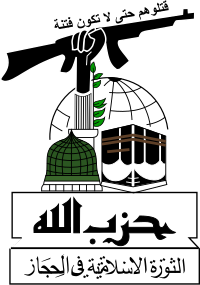Hezbollah Al-Hejaz
| Hezbollah Al-Hejaz حزب الله الحجاز |
|
|---|---|

Hezbollah Al-Hejaz logo
|
|
| Leader(s) |
Abdelkarim Hussein Mohamed Al-Nasser Ahmed Ibrahim Al-Mughassil |
| Dates of operation | 1987–present |
| Motives |
|
| Active region(s) |
|
| Ideology |
Shi'a Islamism Wilayat al-Faqih |
Hezbollah Al-Hejaz (Arabic: حزب الله الحجاز; English: literally Party of God in the Hejaz), Hizbollah in the Hijaz or the Saudi Hizbollah, is a militant organization operating in Saudi Arabia, Kuwait and Bahrain. It is a Shi‘i organization founded in May 1987 in Saudi Arabia’s Eastern Province. It is pro-Khomeini as opposed to the pro-Shirazi Organization for the Islamic Revolution in the Arabian Peninsula (OIR; Munazzamat al-Thawra al-Islamiyya). It is outlawed in Saudi Arabia, being designated as a terrorist organization by the kingdom's government on 7 March 2014.
The Saudi Hizbollah is believed to have been responsible for a number of serious attacks in Saudi Arabia in the second half of the 1980s, including the August 1987 bombing of an Eastern Province gas plant and the March 1988 bombing of oil installations at Ras Tanura and Jubail, as well as a series of bombings in Riyadh in 1985 and 1989. Some have also suspected organized domestic Shiite involvement in the Hajj riots in Mecca in July 1987 in which more than 400 people died after Saudi police cracked down on demonstrating Iranian pilgrims. Questions also shroud the June 1996 Khobar Towers bombing, which was officially blamed on the Hizbollah of the Hijaz. The group may have wanted to assert its disapproval of the 1993 reconciliation between the Saudi Government and the OIR, and may have received operational assistance from the Lebanese Hezbollah. Some observers have disputed this assessment and argued that the operation was carried out by al-Qaida, while others have said that on balance, the available evidence suggests Shiite responsibility.
...
Wikipedia
